Being a gracious guest in someone else’s home is about more than just good manners—it’s about showing respect and appreciation for their space. However, certain actions, whether intentional or not, can come across as rude or inconsiderate. By avoiding these faux pas, you can ensure a pleasant experience for both you and your host. Here are 20 of the rudest things you can do in someone else’s home.
Showing Up Unannounced

Shutterstock
Arriving at someone’s home without prior notice can catch your host off guard, making them feel unprepared. Always give a heads-up and confirm that it’s a convenient time for your visit. This simple courtesy shows that you respect their time and schedule. Unplanned visits can create unnecessary stress for the homeowner.
Refusing to Take Off Your Shoes

Shutterstock
In many households, removing shoes is a standard rule to keep floors clean. Ignoring this custom can be seen as disrespectful. Always ask if the host prefers shoes off and comply if they do. Bringing clean socks or slippers can help you feel more comfortable while respecting their home.
Criticizing Their Décor
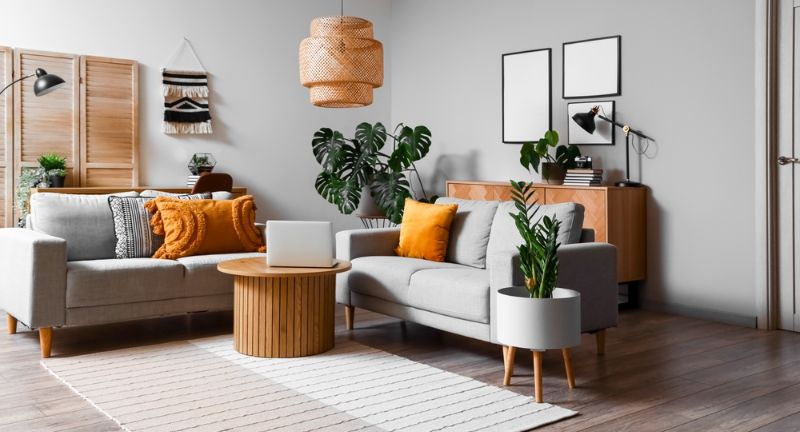
Shutterstock
Making negative comments about someone’s decorating choices is rude and unnecessary. Your host likely put effort into creating a space they love. Even if it’s not your style, keep opinions to yourself unless they ask for feedback. Complimenting their home instead fosters a positive atmosphere.
Ignoring House Rules

Shutterstock
Every home has its own set of rules, from food restrictions to pet boundaries. Disregarding these rules can be seen as disrespectful. Take the time to understand and follow the host’s guidelines. Being mindful of their preferences shows that you value their comfort and hospitality.
Rummaging Through Their Things

Shutterstock
Going through someone else’s belongings without permission is a serious breach of privacy. Whether it’s opening drawers or looking through cabinets, this behavior is highly inappropriate. If you need something, ask the host politely instead. Respecting their personal space is non-negotiable as a guest.
Overstaying Your Welcome
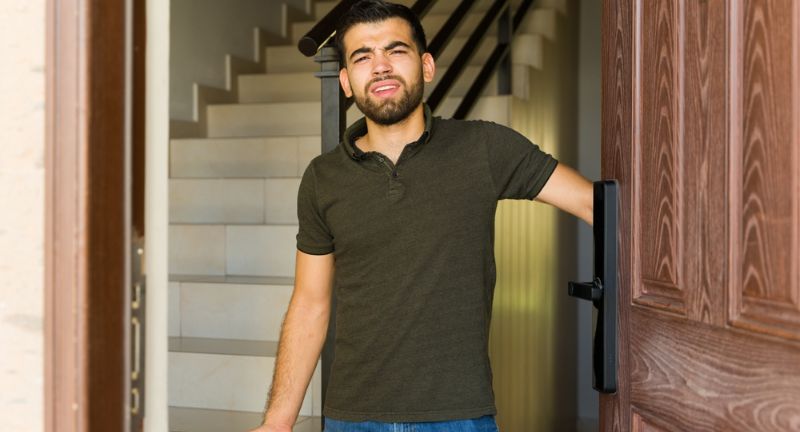
Shutterstock
Lingering too long after a visit can make your host feel uncomfortable or trapped. Pay attention to cues that it’s time to leave, like them cleaning up or checking the time. Plan your visit with a clear end in mind to avoid overstaying. A timely exit leaves a good impression.
Leaving a Mess Behind

Shutterstock
Failing to clean up after yourself is not only rude but also adds unnecessary work for your host. Whether it’s wiping down counters or tidying up the bathroom, leaving spaces as you found them is essential. A considerate guest helps keep the home tidy during their visit. Little efforts go a long way in showing appreciation.
Ignoring Pets
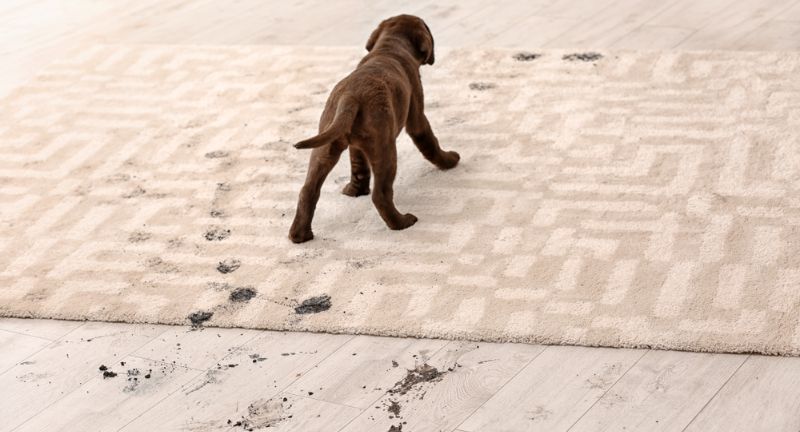
Shutterstock
If your host has pets, ignoring or mistreating them can come across as insensitive. You don’t have to be an animal lover, but showing basic respect for their furry friends is important. If you’re uncomfortable around pets, let the host know kindly. Positive interactions create a more relaxed visit.
Using Their Wi-Fi Without Asking

Shutterstock
Assuming you can connect to someone’s Wi-Fi without asking is both presumptuous and invasive. Always request permission before accessing their network. A polite inquiry ensures you respect their privacy and bandwidth. It’s a small courtesy that hosts greatly appreciate.
Bringing Extra Guests Without Notice

Shutterstock
Showing up with uninvited guests can throw off your host’s plans. It may affect seating, food, or overall arrangements. Always ask in advance if it’s okay to bring someone along. Respecting their preferences keeps the visit smooth and enjoyable for everyone.
Arriving Too Early

Shutterstock
Showing up before the agreed time can catch your host unprepared and disrupt their plans. If you arrive early, wait outside or in your car until the scheduled time. Punctuality shows respect for their schedule and allows them to complete any last-minute preparations. Being considerate sets the tone for a pleasant visit.
Taking Over the TV

Shutterstock
Grabbing the remote and changing channels or streaming your favorite show without permission is incredibly rude. The TV belongs to your host, and they should decide what’s on. If you’d like to watch something, politely ask first. Respecting their preferences avoids creating an awkward atmosphere.
Using the Host’s Personal Toiletries

Shutterstock
Using items like their shampoo, toothpaste, or razor without asking crosses a boundary. Personal toiletries are often off-limits unless explicitly offered. Bring your own essentials or ask your host if you’re in a pinch. This shows you respect their belongings and personal space.
Helping Yourself to Their Fridge

Shutterstock
Digging through your host’s refrigerator or pantry without permission is intrusive. Always wait for them to offer food or drinks, or ask politely if you’re hungry. Helping yourself can make your host feel uncomfortable or even annoyed. Being respectful ensures a smoother visit.
Using Their Phone Charger Without Asking

Shutterstock
Grabbing a charger and plugging in your phone without permission can come across as inconsiderate. Ask your host if you need to charge your device and if they have a spare charger available. This small gesture shows you respect their property. It’s better to ask than assume access to their belongings.
Letting Kids Run Wild
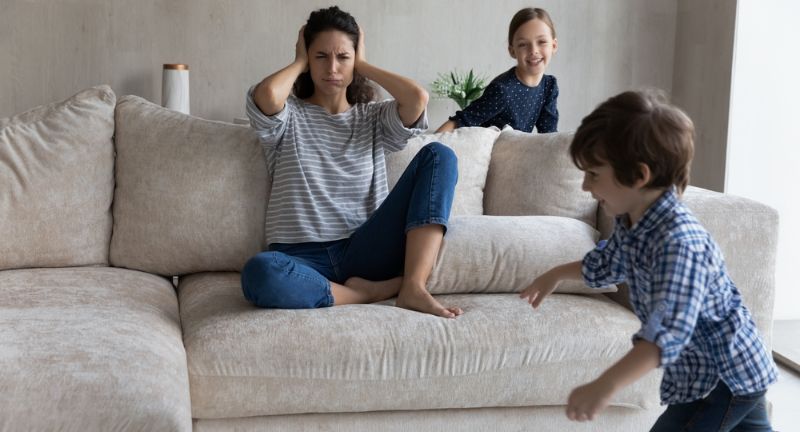
Shutterstock
Bringing children to someone’s home and allowing them to roam freely without supervision can be disruptive. Keep an eye on your kids and ensure they respect the host’s space and belongings. Offering to clean up after any messes they make is also essential. A little effort goes a long way in maintaining harmony.
Making Loud or Unnecessary Noise

Shutterstock
Being overly loud, whether it’s talking, playing music, or stomping around, can disrupt the household. Pay attention to your noise levels, especially if other guests or family members are present. Quiet and mindful behavior shows respect for the space and the people in it. Consideration makes for a more enjoyable visit.
Disrespecting Sleeping Arrangements

Shutterstock
If you’re staying overnight, making demands or complaining about sleeping arrangements can come across as ungrateful. Accept the space your host has prepared for you and show appreciation. Bringing your own pillow or blanket, if needed, can help ensure your comfort without inconveniencing the host. Gratitude is key to being a good guest.
Leaving Lights or Appliances On
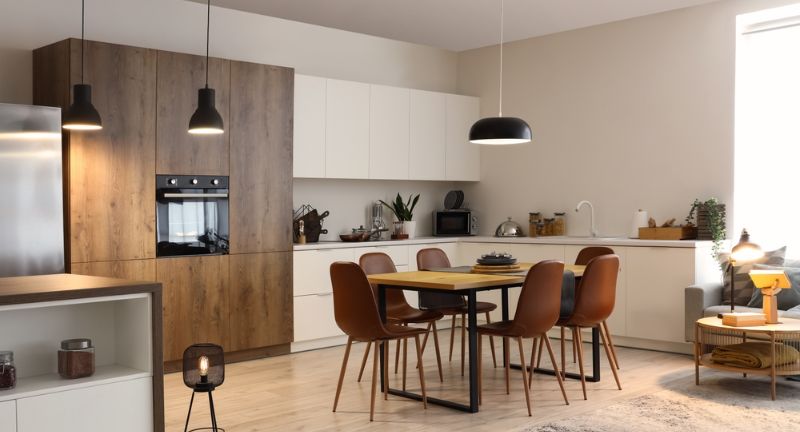
Shutterstock
Leaving lights, TVs, or other appliances on when not in use wastes energy and may irritate your host. Always turn off anything you’ve used before leaving the room. Paying attention to these small details shows you respect their space and energy bills. Thoughtfulness goes a long way in creating a positive experience.
Not Expressing Gratitude

Shutterstock
Failing to thank your host for their hospitality can leave a negative impression. Whether it’s a verbal thank-you, a thoughtful note, or a small gift, expressing gratitude is essential. Acknowledging their efforts shows that you appreciate their generosity. Gratitude is a cornerstone of good guest etiquette.
Conclusion
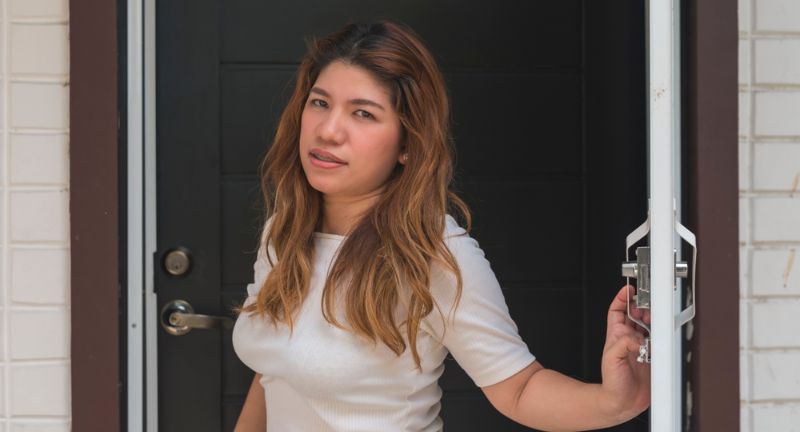
Shutterstock
Being a thoughtful guest is about respecting boundaries, following house rules, and showing gratitude. By avoiding these 20 rude habits, you can ensure your visits are pleasant for both you and your host. A little mindfulness goes a long way in building positive relationships. When in doubt, remember that kindness and consideration are always appreciated.





















































